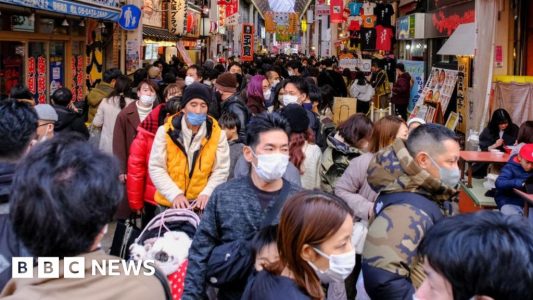IMF: Third of world will be in recession this year - Dispatch Weekly
January 2, 2023 - Reading time: 5 minutes

A third of the global economy will be in recession this year, says the head of the International Monetary Fund (IMF). As the economies of the US, EU, and China slump, 2023 will be “tougher” than last year, according to Kristalina Georgieva, who has headed the IMF since 2019.
The global economy is currently being weighed down by the conflict in Ukraine, rising costs, higher interest rates, as well as the expansion of Covid in China. The IMF revised down its forecast for 2023 global economic growth in October.On the CBS television show Face the Nation, Ms. Georgieva said her organisation was now forecasting that one-third of the world economy would be in recession in 2023.
For hundreds of millions of people, it would feel like a recession even in nations that are not experiencing one, she continued.
Katrina Ell, an economist at Moody’s Analytics in Sydney, said: “While our baseline avoids a global recession over the next year, odds of one are uncomfortably high. Europe, however, will not escape recession and the US is teetering on the verge.”
In October, the IMF revised down its forecast for global economic growth in 2023 as a result of the conflict in Ukraine as well as higher interest rates as central banks around the world work to contain inflation.
Despite the massive spread of coronavirus infections in the nation, China has abandoned its zero-Covid policy and begun to reopen its economy.
China, the second-largest economy in the world, would likely have a difficult beginning to 2023, Ms. Georgieva predicted.
She forecast that the coming months would be difficult for China, which would have a detrimental effect on the country’s progress as well as that of the region and the entire world.
190 nations make up the IMF, an international organisation. They cooperate in an effort to stabilise the world economy. Being a system for early economic warning is one of its most important functions.
The remarks made by Ms. Georgieva will likely worry people across the world, especially in Asia, which had a rough year in 2022.
Because of the conflict in Ukraine, inflation has been slowly increasing throughout the area, and higher borrowing rates have also hurt consumers and businesses.
Data that was made public over the weekend indicated that the Chinese economy will be weak towards the end of 2022.
The official purchasing managers’ index (PMI) for December revealed that as coronavirus infections spread throughout the nation’s factories, factory activity in China declined for the third consecutive month and at the highest rate in over three years.
In the same month, housing prices in 100 cities decreased for the sixth consecutive month, according to a survey conducted by China Index Academy, one of the biggest independent real estate research businesses in the nation.
President Xi Jinping called for more effort and cooperation as China enters a “new chapter”.
Because of the US economy’s slump, there is also reduced demand for goods created in China and other Asian nations like Thailand and Vietnam.
Because borrowing is more expensive and interest rates are higher, some businesses may decide not to invest in growing their operations.
Investors may withdraw funds from an economy due to a lack of growth, leaving nations—particularly those that are poorer—with less money to pay for essential imports like food and energy.
A currency may depreciate in value in comparison to that of more successful economies during these slowdowns, aggravating the situation.
Governmental economies are also impacted by increased loan interest rates, particularly emerging markets, which may find it difficult to pay back their debts.
China has been a key trading partner for the Asia-Pacific area for many years, and it has also provided economic support during times of crisis.
Asian economies are currently dealing with the long-term financial consequences of China’s response to the pandemic.
However, just when inflation seemed to have peaked, rising demand for commodities like oil and iron ore is likely to drive up prices much further.
Ell said: “China’s relaxed domestic Covid restrictions are not a silver bullet. The transition will be bumpy and a source of volatility at least through the March quarter.”

DW Staff
David Lintott is the Editor-in-Chief, leading our team of talented freelance journalists. He specializes in covering culture, sport, and society. Originally from the decaying seaside town of Eastbourne, he attributes his insightful world-weariness to his roots in this unique setting.




